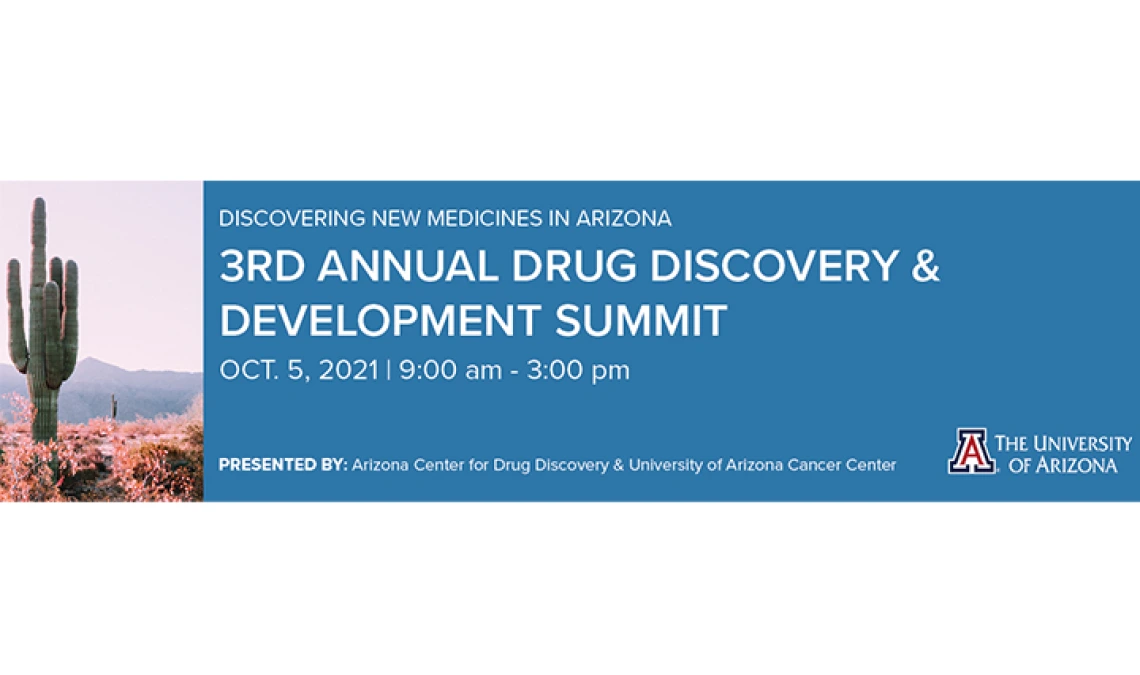Summit Convenes UArizona Health Sciences and Industry Leaders to Spark New Medical Advances

- What: “Discovering New Medicines in Arizona: Drug Discovery and Development Summit”
- When: Tuesday, Oct. 5; 9 a.m. – 3 p.m.
- Where: Online via Zoom. Register at https://arizona.zoom.us/webinar/register/WN_TvpDyXANTAyifsFf_sk_iw.
The Arizona Center for Drug Discovery at the University of Arizona College of Pharmacy and the UArizona Cancer Center will host the third annual “Discovering New Medicines in Arizona: Drug Discovery & Development Summit” on Tuesday, Oct. 5, from 9 a.m. to 3 p.m.
“Drug discovery is a strength at the University of Arizona Health Sciences. This summit showcases what we are capable of accomplishing across interdisciplinary units, and which could potentially translate into future groundbreaking therapies through our connections with industry partners,” said Rick G. Schnellmann, PhD, endowed dean of the UArizona College of Pharmacy and the Howard J. Schaeffer Endowed Chair in Pharmaceutical Sciences.
The summit will explore promising avenues to discovering new drug candidates against diseases prevalent in Arizona. The format is designed to encourage collaborations to enable successful translation of scientific breakthroughs to the bedside.
“The cancer center is privileged to have wonderful collaborators in the College of Pharmacy and Center for Drug Discovery,” said Joann Sweasy, PhD, the Nancy C. and Craig M. Berge Endowed Chair and UArizona Cancer Center director. “We look forward to the summit and nurturing further collaborations to advance drug discovery research that benefits our patients.”
The morning sessions include:
- Multiple Myeloma as a template disease for leveraging the immune system to attack plasma cells that ravage the body.
- Targeting the protein response to treat heart disease.
- Creating molecular snapshots of biomolecules “in action” using serial femtosecond crystallography, opening new avenues for drug discovery against infectious diseases and cancer.
- Advanced approaches to computer-aided drug design, such as physics-based computer simulations and artificial intelligence.
The afternoon sessions include:
- Approaches to identifying novel treatment strategies for T-cell lymphomas resistant to histone deacetylase inhibitors.
- Drawing upon basic science of the T-cell receptor machinery to engineer biomimetic 5-module chimeric antigen receptors that enable cytotoxic T cells to target and kill pathogenic T cells.
- An innovative multitier, targeted screening strategy to identify inhibitors against the transcription factor NRF2, with the goal of making cancer cells more susceptible to chemotherapeutic drugs.
Confirmed speakers include:
- Joseph Mikhael, MD, professor, Applied Cancer Research and Drug Discovery Division, Translational Genomics Research Institute, and Chief Medical Officer, International Myeloma Foundation
- Chris Glembotski, PhD, associate dean of research, director of the Translational Cardiovascular Research Center, professor of internal medicine, UArizona College of Medicine – Phoenix
- Petra Fromme, PhD, director, Biodesign Center for Applied Structural Discovery, Arizona State University
- Anil Nair, PhD, vice president, In Silico Drug Discovery, Ligand Pharmaceuticals
- Steffan Nawrocki, PhD, associate professor of medicine, UArizona College of Medicine – Tucson, and research director for translational medical oncology, UArizona Cancer Center
- Michael Kuhns, PhD, associate professor of immunobiology, UArizona College of Medicine – Tucson
- Donna Zhang, PhD, Musil Family Endowed Chair in Drug Discovery and professor of pharmacology and toxicology, UArizona College of Pharmacy
Registration is required. To register and view the full agenda, visit the “Discovering New Medicines” event website.
Photos available upon request.
Reporters and editors: Please note that the University of Arizona Health Sciences is separately recognized from the University of Arizona, similar to other academic health centers across the country. The preferred first reference is University of Arizona Health Sciences; the preferred second reference is UArizona Health Sciences.
Media contact:
Megan Guthrie
520-626-2280
mlg1@email.arizona.edu
About the University of Arizona Cancer Center
The University of Arizona Cancer Center is the only National Cancer Institute-designated Comprehensive Cancer Center with headquarters in Arizona. The UArizona Cancer Center is supported by NCI Cancer Center Support Grant No. CA023074. With its primary location at the University of Arizona in Tucson, the Cancer Center has more than a dozen research and education offices throughout the state, with more than 300 physicians and scientists working together to prevent and cure cancer. For more information: cancercenter.arizona.edu (Follow us: Facebook| Twitter | YouTube).
About the University of Arizona College of Pharmacy
The University of Arizona College of Pharmacy is the premier pharmacy college in the Southwest, and one of the top in the nation, focused on drug discovery, toxicology, pharmaceutics, health outcomes and sciences, pharmaceutical education and research through interprofessional training and collaborative public/private partnerships. Preparing pharmacists and pharmaceutical scientists in undergraduate, professional, graduate and post-doctoral programs, the college embraces an entrepreneurial spirit, providing tailored educational opportunities to broaden students' experiences. Established 72 years ago as the first health sciences college at UArizona, the college has a long history of improving science and health, both in Arizona and around the world. It is currently ranked No. 8 among the nation’s 143 colleges of pharmacy by the American Association of Colleges of Pharmacy. For more information: pharmacy.arizona.edu (Follow us: Facebook | Twitter | YouTube | Instagram).
About the University of Arizona Health Sciences
Located on campuses in Tucson and Phoenix, the University of Arizona Health Sciences is one of the top-ranked academic medical centers in the southwestern United States. UArizona Health Sciences includes the College of Medicine – Phoenix, College of Medicine – Tucson, College of Nursing, College of Pharmacy and the Mel and Enid Zuckerman College of Public Health. In addition, 12 UArizona Health Sciences centers and programs focus on cancer, neurodegenerative diseases, pain and addiction, and respiratory diseases; biomedical informatics, health technology innovation and simulation training; and precision health care and health disparities. A leader in next-generation education, biomedical research and public outreach, UArizona Health Sciences employs nearly 5,000 people, has approximately 4,000 students and 900 faculty members, and garners more than $200 million in research grants and contracts annually. For more information: uahs.arizona.edu(Follow us: Facebook | Twitter | YouTube | LinkedIn | Instagram).

